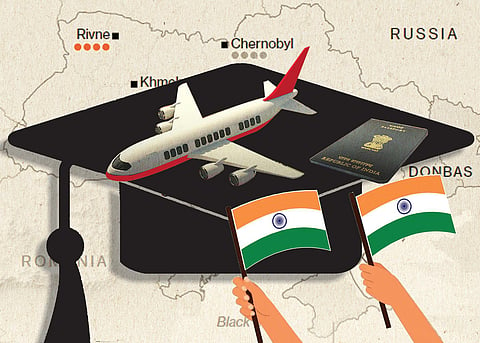

India has an excellent track record in successfully evacuating its citizens from conflict zones. In one of the massive operations in the country’s history, the Indian Air Force and Air India airlifted nearly 170,000 Indian nationals from Kuwait in August-October 1990.
India repeated its feat in September 1996 from the UAE, in March 2011 from Egypt, in April 2015 from Yemen, in January-February 2020 from Wuhan and then later from various countries at the peak of the Covid pandemic and from Afghanistan in August 2021. Irrespective of the political colour of the ruling regime, the evacuation of stranded Indian citizens from foreign lands has been one of the things we do with remarkable efficiency.
However, rescuing stranded Indians from the war zone of Ukraine has become highly politicised. The government uses this as a PR opportunity, with ministers lining up like air hostesses to at least offer a namaste and grin at the camera or, if lucky, get a chance of addressing the harangued students and turning it into an election rally. What was a routine many years back has become a tool for propaganda.
Some officers are even seen as forcing students to shout political slogans, hoping to please the powers and win favours. Meanwhile, the Opposition is using the misery of those stranded and the trauma of parents to paint the government as inefficient and publicity-hungry. The entire act of evacuation has turned into a media circus, with politicians of all hues fighting it out for appropriating credit and assigning blame. This tragicomical farce has dented India’s image in the global arena.
The authorities can arguably be blamed for using this conflict between two foreign powers as a PR stunt. Still, there is no doubt that considerable resources are being used to ensure that Indians are being brought back safely to our soil. One cannot even fathom the tremendous pressure that the officials of these embassies would be under while trying to do this thankless job.
However, is it the government’s duty to ensure the safety of its citizens in a foreign country? These are uncomfortable questions to ask, and no parent who has a son or daughter in the war zone is going to forgive me for asking this. Let me put a caveat here. If my daughter or son had been studying in a foreign country that suddenly turned into a war zone, I would want my government to do anything possible to bring them back.
I would like the government to send the Indian army, navy and airforce to mount an all-out rescue mission to bring back my children. I can’t blame any parents for wishing for the safety of their children. Demanding that the government prioritise my child’s safety over anything else would come naturally to me or any parent. Still, the harsh truth is that it is not the duty of the government to bring the stranded Indians back home at taxpayers’ expense.
It isn’t as if anyone forced non-resident Indians to leave India, whether students or earning members. It was their choice to find better pastures. At the first given opportunity, these would be the very people who would relinquish their Indian citizenship for a foreign one. Many of those who retain Indian citizenship while living in foreign lands do so because the host countries are unwilling to offer them citizenship.
The question is whether India, a developing nation, should use its manpower and resources to bring back the prodigal sons and daughters when the going gets tough in their adopted countries. Two years back, there was a far bigger crisis ravishing India.
When the Covid lockdown happened, millions of poor Indians commenced their journey on foot to their homes thousands of kilometres away. No ministers and VIPs were standing with bouquets waiting for them. Instead, police officers were roving around with lathis to break their backs for the crime of being desperate and destitute and walking on the roads in a free country.
No demented media men were screaming and hopping around in their air-conditioned studios, frothing at the plight of these people. The Opposition leaders were not howling with indignation on prime-time TV.
Now media is awash with sob stories of Indians walking some kilometres in Ukraine. The tall claims of a heroic Indian rescue mission led by the ministers who are no less than the knights in shining armour are countered with questions like why the government has not ordered the Indian Army to invade Ukraine and bring all the non-resident Indians back.
The contrast could not be starker with how we reacted to the plight of the internally displaced. The vociferous entitled middle and upper class like us have no qualms in demanding the impossible from our government. There is no denying that bringing back well-dressed, well-groomed, well-fed Indians in aircraft is a much better public relationship stunt than running some rickety public transport buses to take a few million starving labourers home.
However, the question would always remain in our conscience: why should the taxpayers’ money and the effort of an elected government be disproportionately spent on such rescue missions? At best, such missions can only be considered a moral duty of the government, and it is not by any means a right that we can demand.
Anand Neelakantan
mail@asura.co.in
Author of Asura, Ajaya series, Vanara and Bahubali trilogy